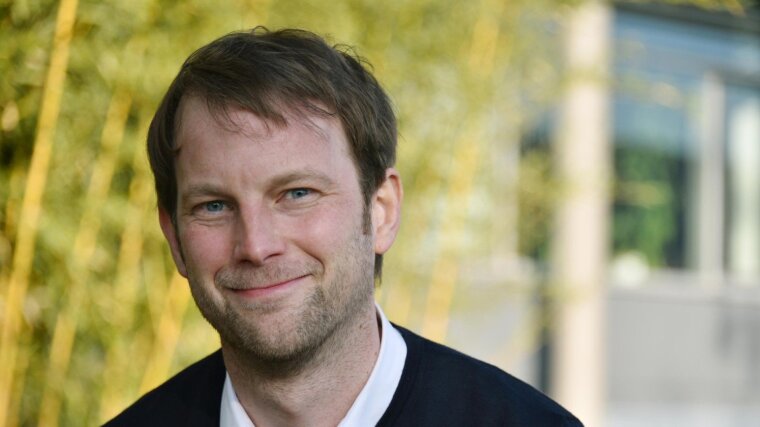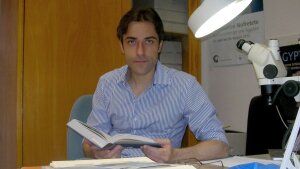
- Life
- Research
- Awards and Personnel
Published: | By: Ute Schönfelder/Axel Burchardt
The European Research Council (ERC) announced today that the University of Jena, Germany will receive two major research grants, each endowed with some two million euros. A “Consolidator Grant” will be awarded to microbiologist Prof. Kai Papenfort and classics scholar Prof. Christian Vassallo. The funding will support Papenfort’s project “ArtRNA – Artificial RNA regulators to probe, control, and design gene regulatory networks in bacteria” as well as Vassallo’s study “APATHES – Assessing Philosophical Authors and Texts from Herculaneum and elsewhere on Early Stoicism: Insights into ancient logic, physics, and ethics towards a new von Arnim”.
Small RNA molecules regulate gene activity in bacteria
The microbiologist Kai Papenfort and his team are working on the function of small RNA molecules (sRNA) as part of the “Balance of the Microverse” Cluster of ExcellenceExternal link at the University of Jena. RNA is found in all organisms and plays an important role as an information carrier in protein biosynthesis. “In addition, small RNA molecules also take on regulatory tasks in cell metabolism,” says Papenfort. In bacteria, for example, the activity of an estimated one-fifth of all genes is controlled by small RNA molecules. In practice, they can switch genes on or off.
Papenfort and his team are making use of this mechanism, which is widespread in nature, for applications in synthetic biology, developing artificial sRNA molecules with which they can specifically intervene in the genetics of bacteria. “With artificial sRNA regulators, the molecular mechanisms of microbial gene expression can be studied in detail,” explains 41-year-old Papenfort. In this way, defined genes can be targeted and their activity controlled through specific RNA design. “This will enable us to gain fundamental insights into the gene functions and regulatory circuits in organisms.” This method also makes it possible, for example, to systematically investigate the reaction to antibiotics in pathogenic bacteria.
The fight against multi-resistant pathogens
There is still a great need for this, as millions of deaths worldwide are caused by antibiotic-resistant bacteria every year. For this reason, the European Commission and the WHO have made the fight against multi-resistant pathogens a central goal in their health and food safety programmes. “We expect that the work outlined in our project will help to achieve this goal and promote a better understanding of the emergence of antibiotic resistance and the underlying molecular mechanisms,” says Papenfort, who also received an ERC “Starting Grant” in 2017.
The funding from the “Consolidator Grant” will be used to fill two postdoctoral and one doctoral position in Papenfort’s team over the next five years. “Specifically, our research will involve three areas of work,” says the Jena microbiologist. First, the mechanisms that play a role in the interaction between sRNA and bacterial genes will be clarified using large sRNA libraries with more than 250,000 differently structured sRNA molecules. Second, based on this, the researchers want to specifically target bacterial genes that play a role in antibiotic effects or resistance. And third, they want to develop these techniques further, so that almost any bacterial gene can be regulated with artificial sRNA molecules and used, for example, for biotechnological applications.
New edition of classic work on the ancient Stoics
Classical scholar Prof. Christian Vassallo.
Image: privatAnother ERC Consolidator Grant has been awarded to Prof. Christian Vassallo. The Italian historian of philosophy, classical philologist and papyrologist from the Italian Universita della Calabria, Cosenza is a visiting scholar at the University of Jena this year, funded by a research award from the Alexander von Humboldt Foundation. Together with classics scholars from Jena, he is researching the foundations for a systematic reconstruction of the philosophy of Diogenes of Babylon and his role in the history of early Stoicism.
The Institute of Classics is also involved in the ERC-funded international project APATHES. “Jena will be the reference point for the ‘International Centre for Stoicism Research’, the establishment of which is an important part of my APATHES project,” says Prof. Vassallo. A research team under his leadership intends to reissue a standard work on the ancient Stoics, the “Stoicorum Veterum Fragmenta” by Johannes von Arnim (1903/1905), in line with the current state of research. The new edition of the fragments of the ancient Stoics will include the texts that have survived on papyrus fragments and will be supplemented by an English translation.
“The influence of the Stoics on the history of philosophy is huge,” emphasises Vassallo. Stoicism, founded in the 4th-3rd century BCE, represents for the Italian “one of the most fascinating philosophical systems in the history of ancient thought”. Because the majority of its original works have been lost, “scholarship is confronted with enormous problems of interpretation in examining the large number of testimonies concerning it”, says Vassallo, describing why he is going to tackle the new edition of the work. He is aware that the project “may be very ambitious and really scary”. But he believes it can be achieved, with the aid of a central goal of Stoic ethics: apathês – to be “dispassionate” and indifferent to passions and disturbances – he adds with a smile.
Presentation of the APATHES project on 16 February
Anyone who is interested in the ERC project, APATHES, and would like to meet Christian Vassallo will have the opportunity to do so on 16 February from 4 to 6 pm. There will be a public research seminar on Diogenes of Babylon in the Papyrus Collection of Friedrich Schiller University Jena (Fürstengraben 25). Vassallo will present the structure of the new edition of the fragments of this important representative of early Stoicism, whose thinking can be reconstructed mainly thanks to the papyri from Herculaneum. At this seminar, Karlheinz Hülser from the University of Konstanz will also talk about the fragments on the dialectic of Diogenes of Babylon.
Fürstengraben 25
07743 Jena Google Maps site planExternal link
